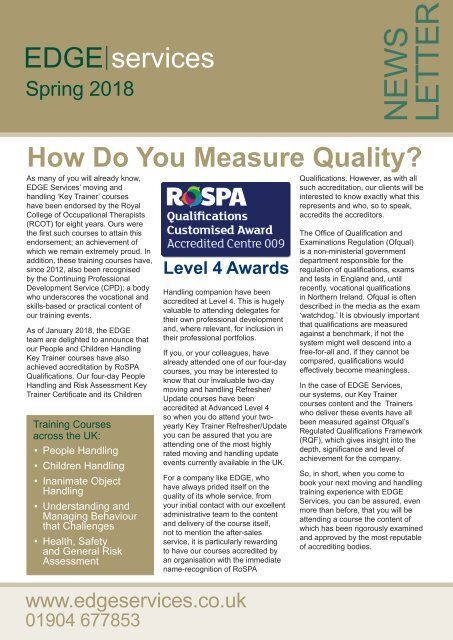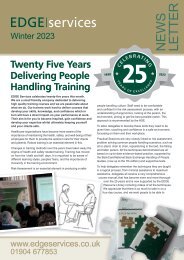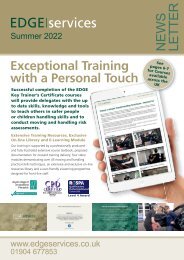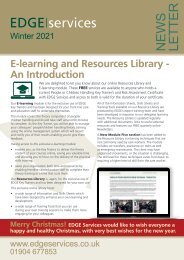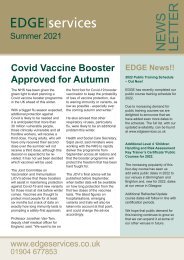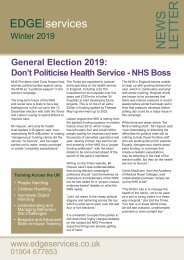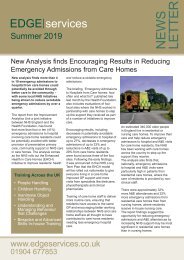EDGE Services Newsletter March 2018
EDGE Services Newsletter March 2018
EDGE Services Newsletter March 2018
Create successful ePaper yourself
Turn your PDF publications into a flip-book with our unique Google optimized e-Paper software.
<strong>EDGE</strong> services<br />
Spring <strong>2018</strong><br />
NEWS<br />
LETTER<br />
How Do You Measure Quality?<br />
As many of you will already know,<br />
<strong>EDGE</strong> <strong>Services</strong>’ moving and<br />
handling ‘Key Trainer’ courses<br />
have been endorsed by the Royal<br />
College of Occupational Therapists<br />
(RCOT) for eight years. Ours were<br />
the first such courses to attain this<br />
endorsement; an achievement of<br />
which we remain extremely proud. In<br />
addition, these training courses have,<br />
since 2012, also been recognised<br />
by the Continuing Professional<br />
Development Service (CPD); a body<br />
who underscores the vocational and<br />
skills-based or practical content of<br />
our training events.<br />
As of January <strong>2018</strong>, the <strong>EDGE</strong><br />
team are delighted to announce that<br />
our People and Children Handling<br />
Key Trainer courses have also<br />
achieved accreditation by RoSPA<br />
Qualifications. Our four-day People<br />
Handling and Risk Assessment Key<br />
Trainer Certificate and its Children<br />
Training Courses<br />
across the UK:<br />
• People Handling<br />
• Children Handling<br />
• Inanimate Object<br />
Handling<br />
• Understanding and<br />
Managing Behaviour<br />
that Challenges<br />
• Health, Safety<br />
and General Risk<br />
Assessment<br />
Level 4 Awards<br />
Handling companion have been<br />
accredited at Level 4. This is hugely<br />
valuable to attending delegates for<br />
their own professional development<br />
and, where relevant, for inclusion in<br />
their professional portfolios.<br />
If you, or your colleagues, have<br />
already attended one of our four-day<br />
courses, you may be interested to<br />
know that our invaluable two-day<br />
moving and handling Refresher/<br />
Update courses have been<br />
accredited at Advanced Level 4<br />
so when you do attend your twoyearly<br />
Key Trainer Refresher/Update<br />
you can be assured that you are<br />
attending one of the most highly<br />
rated moving and handling update<br />
events currently available in the UK.<br />
For a company like <strong>EDGE</strong>, who<br />
have always prided itself on the<br />
quality of its whole service, from<br />
your initial contact with our excellent<br />
administrative team to the content<br />
and delivery of the course itself,<br />
not to mention the after-sales<br />
service, it is particularly rewarding<br />
to have our courses accredited by<br />
an organisation with the immediate<br />
name-recognition of RoSPA<br />
www.edgeservices.co.uk<br />
01904 677853<br />
Qualifications. However, as with all<br />
such accreditation, our clients will be<br />
interested to know exactly what this<br />
represents and who, so to speak,<br />
accredits the accreditors.<br />
The Office of Qualification and<br />
Examinations Regulation (Ofqual)<br />
is a non-ministerial government<br />
department responsible for the<br />
regulation of qualifications, exams<br />
and tests in England and, until<br />
recently, vocational qualifications<br />
in Northern Ireland. Ofqual is often<br />
described in the media as the exam<br />
‘watchdog.’ It is obviously important<br />
that qualifications are measured<br />
against a benchmark, if not the<br />
system might well descend into a<br />
free-for-all and, if they cannot be<br />
compared, qualifications would<br />
effectively become meaningless.<br />
In the case of <strong>EDGE</strong> <strong>Services</strong>,<br />
our systems, our Key Trainer<br />
courses content and the Trainers<br />
who deliver these events have all<br />
been measured against Ofqual’s<br />
Regulated Qualifications Framework<br />
(RQF), which gives insight into the<br />
depth, significance and level of<br />
achievement for the company.<br />
So, in short, when you come to<br />
book your next moving and handling<br />
training experience with <strong>EDGE</strong><br />
<strong>Services</strong>, you can be assured, even<br />
more than before, that you will be<br />
attending a course the content of<br />
which has been rigorously examined<br />
and approved by the most reputable<br />
of accrediting bodies.
2 Spring <strong>2018</strong> <strong>Newsletter</strong><br />
Editor’s column<br />
Greetings!<br />
I’d like to start this edition of our newsletter with an<br />
apology. We aim, as you know, to bring you relevant<br />
news – some heavy, some light – from the health<br />
and social care sector. This time around, however,<br />
some of you may think we’ve gone a little selfindulgently<br />
<strong>EDGE</strong>-centric!<br />
Talking about yourself is not always attractive but<br />
excuse us if, for once, we give a short blast on our<br />
own trumpet. We celebrate, this year, the twentieth<br />
anniversary of our fi rst day’s training: a notoriously<br />
wet Wednesday in Huddersfi eld, November 1998,<br />
and we mark this anniversary with two exciting<br />
developments: the accreditation of our key courses<br />
by RoSPA Qualifi cations; and the arrival of our<br />
Resource Library/E-Learning service to all our Key<br />
Trainer Manual Handling delegates.<br />
We hope you will agree that this news is worth<br />
sharing with you and a testament to our ongoing<br />
commitment to provide the very best training service<br />
possible.<br />
Very best wishes,<br />
Kate Lovett<br />
20 Years of <strong>EDGE</strong><br />
November <strong>2018</strong> marks the 20th anniversary<br />
of <strong>EDGE</strong> <strong>Services</strong>.<br />
<strong>EDGE</strong> was started by Kate Lovett in 1998. She set<br />
up as a sole trader to provide training that so many<br />
organisations were struggling to fi nd. Demand was such<br />
that Kate soon found herself travelling further and further<br />
afi eld. One by one, additional trainers joined the team;<br />
and, before long, <strong>EDGE</strong> had established itself at the<br />
forefront of health and safety training across the UK.<br />
Twenty years on and <strong>EDGE</strong> continues to go from strength<br />
to strength.<br />
The quality of our training and of our team’s<br />
accomplished work continues to receive exceptional feedback<br />
from our clients and from professional bodies within<br />
the healthcare and social care industries. Such feedback<br />
and professional recognition has been fundamental in<br />
establishing our reputation as experts in our fi eld and,<br />
because of this, we are extremely proud to celebrate long<br />
term business relationships with so many of our clients.<br />
<strong>EDGE</strong> <strong>Services</strong> are continually investing in our talented<br />
staff. Our training programmes grow and develop in<br />
reaction to new advancements and recommended best<br />
practice within the industry and our experienced team are<br />
always looking for new ways in which we can enhance<br />
the training and services we provide.<br />
<strong>EDGE</strong> embraces the challenges facing the health care,<br />
social care and special educational needs sectors in<br />
terms of training, providing the best solutions available<br />
and independently applying these to meet each of our<br />
client’s individual learning needs.<br />
As we look back on our history of accomplishments, we<br />
would like to say a huge thank you to all our clients and<br />
staff. <strong>EDGE</strong> <strong>Services</strong> would not be here without your<br />
support and commitment. You are all truly valued – here’s<br />
to another 20 years of excellence working with you!<br />
This is the last hard, paper copy of the <strong>EDGE</strong><br />
newsletter.<br />
To ensure you receive future editions as an email<br />
attachment, please visit www.edgeservices.co.uk and<br />
click on the NEWS tab to subscribe.<br />
<strong>EDGE</strong> services
A landmark trial for Huntington’s disease has announced<br />
positive results, suggesting that an experimental drug<br />
could become the first to slow the progression of the<br />
devastating genetic illness.<br />
The results have been hailed as “enormously significant”<br />
because it is the first time any drug has been shown<br />
to suppress the effects of the Huntington’s mutation<br />
that causes irreversible damage to the brain. Current<br />
treatments only help with symptoms, rather than slowing<br />
the disease’s progression.<br />
Prof Sarah Tabrizi, director of University College London’s<br />
Huntington’s Disease Centre who led the phase 1 trial,<br />
said the results were “beyond what I’d ever hoped ... The<br />
results of this trial are of ground-breaking importance for<br />
Huntington’s disease patients and families,” she said.<br />
The results have also caused ripples of excitement<br />
across the scientific world because the drug, which is a<br />
synthetic strand of DNA, could potentially be adapted to<br />
target other currently incurable brain disorders such as<br />
Alzheimer’s and Parkinson’s. The Swiss pharmaceutical<br />
giant Roche has paid a $45m licence fee to take the drug<br />
forward to clinical use.<br />
Huntington’s is a degenerative disease caused by a<br />
single gene defect that is passed down through families.<br />
The first symptoms, which typically appear in middle<br />
age, include mood swings, anger and depression. Later<br />
patients develop uncontrolled jerky movements, dementia<br />
and ultimately paralysis. Some people die within a<br />
decade of diagnosis.<br />
“Most of our patients know what’s in their future,” said<br />
Ed Wild, a UCL scientist and consultant neurologist at<br />
the National Hospital for Neurology and Neurosurgery in<br />
London, who administered the drug in the trial.<br />
The mutant Huntington’s gene contains instructions for<br />
cells to make a toxic protein, called huntingtin. This code<br />
is copied by a messenger molecule and dispatched to the<br />
cell’s protein-making machinery. The drug, called Ionis-<br />
HTTRx, works by intercepting the messenger molecule<br />
and destroying it before the harmful protein can be made,<br />
effectively silencing the effects of the mutant gene.<br />
To deliver the drug to the brain, it has to be injected into<br />
the fluid around the spine using a four-inch needle.<br />
Prof John Hardy, a neuroscientist at UCL who was not<br />
involved in the trial, said: “If I’d have been asked five<br />
years ago if this could work, I would have absolutely said<br />
no. The fact that it does work is really remarkable.”<br />
The trial involved 46 men and women with early stage<br />
Huntington’s disease in the UK, Germany and Canada.<br />
The patients were given four spinal injections one month<br />
apart and the drug dose was increased at each session;<br />
roughly a quarter of participants had a placebo injection.<br />
After being given the drug, the concentration of harmful<br />
protein in the spinal cord fluid dropped significantly and<br />
in proportion with the strength of the dose. This kind of<br />
Spring <strong>2018</strong> <strong>Newsletter</strong> 3<br />
New Trial shows Huntington’s Drug Slow<br />
Progress of Disease<br />
closely matched relationship normally indicates a drug is<br />
having a powerful effect.<br />
“For the first time a drug has lowered the level of the toxic<br />
disease-causing protein in the nervous system, and the<br />
drug was safe and well-tolerated,” said Tabrizi. “This is<br />
probably the most significant moment in the history of<br />
Huntington’s since the gene [was isolated].”<br />
The trial was too small, and not long enough, to show<br />
whether patients’ clinical symptoms improved, but Roche<br />
is now expected to launch a major trial aimed at testing<br />
this.<br />
If the future trial is successful, Tabrizi believes the drug<br />
could ultimately be used in people with the Huntington’s<br />
gene before they become ill, possibly stopping symptoms<br />
ever occurring. “They may just need a pulse every three<br />
to four months,” she said. “One day we want to prevent<br />
the disease.”<br />
The drug, developed by the California biotech firm Ionis<br />
Pharmaceuticals, is a synthetic single strand of DNA<br />
customised to latch onto the huntingtin messenger<br />
molecule.<br />
The unexpected success raises the tantalising possibility<br />
that a similar approach might work for other degenerative<br />
brain disorders. “The drug’s like Lego,” said Wild. “You<br />
can target [any protein].”<br />
For instance, a similar synthetic strand of DNA could be<br />
made to target the messenger that produces misshapen<br />
amyloid or tau proteins in Alzheimer’s.<br />
“Huntington’s alone is exciting enough,” said Hardy, who<br />
first proposed that amyloid proteins play a central role in<br />
Alzheimer’s. “I don’t want to overstate this too much, but<br />
if it works for one, why can’t it work for a lot of them? I am<br />
very, very excited.”<br />
Prof Giovanna Mallucci, associate director of UK<br />
Dementia Research Institute at the University of<br />
Cambridge, described the work as a “tremendous step<br />
forward” for individuals with Huntington’s disease and<br />
their families.<br />
“Clearly, there will be much interest into whether it can<br />
be applied to the treatment of other neurodegenerative<br />
diseases like Alzheimer’s,” she added. However, she<br />
said that in the case of most other disorders the genetic<br />
causes are complex and less well understood, making<br />
them potentially harder to target.<br />
About 10,000 people in the UK have the condition and<br />
about 25,000 are at risk. Most people with Huntington’s<br />
inherited the gene from a parent, but about one in five<br />
patients have no known family history of the disease.<br />
The full results of the trial are expected to be published in<br />
a scientific journal next year. To read more on this article<br />
visit https://www.theguardian.com/science<br />
www.edgeservices.co.uk<br />
01904 677853
4 Spring <strong>2018</strong> <strong>Newsletter</strong><br />
Legal Cases<br />
NHS Trust Fined after Deaths of Elderly Patients<br />
A Midlands based Hospital NHS Trust has been fined<br />
following a series of Health and Safety Executive (HSE)<br />
investigations into the deaths of five elderly patients.<br />
Stafford Crown Court heard that the patients, aged<br />
between 72 and 92, sustained fatal injuries as result of<br />
falls whilst being cared for in hospitals run by the NHS<br />
Trust between June 2011 and November 2012.<br />
The HSE investigations found that fall prevention<br />
measures, including close supervision of those in a<br />
confused mental state, were not properly applied.<br />
This was made worse by poor consideration and<br />
communication surrounding measures to protect against<br />
falls arising from each patient’s frailties.<br />
The Trust pleaded guilty to breaching Section 3(1) of<br />
the Health and Safety at Work Act 1974 and was fined<br />
£333,333 and ordered to repay £130,000 in costs.<br />
In a statement, a great niece of one the patients who died<br />
said, on behalf of the family:<br />
“Edna was a wonderful sister, Aunt and finally a Great<br />
Aunt to myself, sitting proudly as the eldest at the head<br />
of the family. It’s been a difficult five years without such<br />
a special lady who I regarded as another grandparent<br />
having lost her own child many years ago, and even more<br />
difficult with all the speculation surrounding her death.<br />
“I am just thankful that, after today’s events, myself and<br />
the rest of her remaining family can finally have some<br />
closure and move on from the somewhat horrifying past<br />
events and undignified circumstances in which Edna<br />
passed away.<br />
“Nothing will ever rectify, and<br />
nothing will ever justify the tragic<br />
events that led to Auntie Edna’s<br />
death, but today I am grateful<br />
for the Trust’s open admittance to<br />
fault and I can only hope that bringing<br />
my Aunt’s case to light will go a long<br />
way in preventing such catastrophic future errors.<br />
“Finally, as a family we’d like to thank the Health and<br />
Safety Executive for pursuing this investigation, as<br />
well as its impeccable support and professionalism<br />
throughout the whole lengthy case in aim of achieving<br />
the best justice possible.”<br />
Vince Joyce, Health and Safety Executive Principal<br />
Inspector for Shropshire said:<br />
“First of all, our thoughts remain with each of the<br />
five bereaved families, as they have throughout our<br />
investigations. Our thorough inquiries found that these<br />
elderly patients, already vulnerable, were exposed to an<br />
acute risk of serious injury from falling.<br />
“It was the duty of the Hospital NHS Trust to take<br />
reasonable precautions to prevent vulnerable patients<br />
from falling. Although policies and procedures were<br />
in place for this to happen, they were not consistently<br />
applied at the point of care. In different ways, these<br />
patients were left exposed to the risk of falling which<br />
resulted in their deaths. It is right for the Trust to have<br />
been held to account for those failings in the Court<br />
today.”<br />
http://press.hse.gov.uk/2017/nhs-trust-fined-followingfalls-deaths/<br />
Local Authority Fined After Social Workers Assaulted<br />
A local authority has been fined after two of its social<br />
workers were assaulted on a home visit by the mother of<br />
a vulnerable child they were visiting.<br />
Westminster Magistrates’ Court heard how, on 3 July<br />
2015, two social workers visited the home of a vulnerable<br />
child to carry out a child safety plan assessment. While<br />
note-taking, both social workers were struck over the<br />
head with a metal object by the mother, resulting in one<br />
of them being knocked temporarily unconscious. While<br />
both received serious wounds to the head, the social<br />
worker knocked unconscious was later diagnosed with<br />
Post Traumatic Stress Disorder (PTSD).<br />
The investigation by the Health and Safety Executive<br />
found the local authority failed to follow its corporate lone<br />
working policy or violence and aggression guidance.<br />
No risk assessment was completed and staff were not<br />
trained accordingly. The local authority also failed to add<br />
an aggression marker to make the social workers aware<br />
of the hazards posed by the mother who was known to<br />
have a history of violence.<br />
The local authority pleaded guilty of breaching the Health<br />
& Safety at Work etc. Act 1974, section 2(1), were fined<br />
£100,000 and ordered to pay costs of £10,918.88<br />
After the hearing, HSE inspector Neil Fry commented:<br />
“Violent and aggressive incidents are the third biggest<br />
cause of injuries reported to HSE from the health and<br />
social care sector.<br />
“The local authority in this case failed to adhere to<br />
and implement its own systems and procedure for<br />
the management of lone working and violence and<br />
aggression against social workers. This risk could have<br />
been reduced in a number of ways including carrying out<br />
the visit in a controlled environment, such as the local<br />
social workers’ office.”<br />
http://press.hse.gov.uk/2017/local-authority-fined-aftersocial-workers-assaulted/<br />
<strong>EDGE</strong> services
Care Home Operator Fined After Death<br />
of Vulnerable Patient<br />
A care home operator has been fined after the death of<br />
a vulnerable patient in one of its residences in Owestry,<br />
Shropshire.<br />
Shrewsbury Crown Court heard how, on 15 February 2015,<br />
the resident of the care home in question was found at<br />
the bottom of a flight of stairs leading to the cellar with his<br />
wheelchair on top of him. The resident, who had one leg<br />
amputated at the knee, was able to operate his wheelchair<br />
alone and had periods of confusion. He was last seen by<br />
the nurse on shift going into a lift by the cellar door to go to<br />
his room on the first floor.<br />
An investigation by the Health and Safety Executive (HSE)<br />
found that although the door to the cellar had a key pad<br />
latch and was fitted with a self-closing device, it opened<br />
onto the stairs so that the first step was directly behind the<br />
door. The handrail was fitted in such a way that it was not<br />
possible to have a good handhold along its length, and<br />
there was no hand rail at the top of the stairs due to the<br />
door opening. The door was used daily by kitchen staff and<br />
the maintenance man. The investigation also found that the<br />
care home had not produced a risk assessment for access<br />
and use of the cellar and therefore had did not take account<br />
of the fact that the door opened inwards directly onto the<br />
stairs without a sufficient landing area.<br />
The care home operator was found guilty of breaching<br />
Sections 2(1) and 3(1) of the Health and Safety at Work<br />
Act 1974 and has been fined £120,000 and ordered to pay<br />
costs of £41,997.48.<br />
Speaking after the hearing, HSE inspector Stephen Shaw<br />
said: “This tragic incident could have been avoided.<br />
“It is unlikely this resident would have known the key pad<br />
number to the door, therefore the door cannot have been<br />
properly closed and locked.<br />
“In this case, the risk assessment should have identified the<br />
potential risks to both care home employees, visitors and<br />
residents of a door which opened inward without sufficient<br />
landing.”<br />
http://press.hse.gov.uk/<strong>2018</strong>/care-home-operator-finedafter-death-of-vulnerable-patient/<br />
This is the last hard, paper copy of the <strong>EDGE</strong><br />
newsletter.<br />
To ensure you receive future editions as an email<br />
attachment, please visit www.edgeservices.co.uk and<br />
click on the NEWS tab to subscribe.<br />
Spring <strong>2018</strong> <strong>Newsletter</strong> 5<br />
Enhance Your Moving and Handling<br />
Skills with <strong>EDGE</strong> Key Trainer<br />
Workshops – New for <strong>2018</strong><br />
These one day ‘key trainer’ workshops have been<br />
designed to reflect changes within the care sector and<br />
to further advance the moving and handling and risk<br />
assessing skills and knowledge of <strong>EDGE</strong>-trained key<br />
trainers.<br />
The workshops will focus on the following topics:<br />
Single-handed Care Packages<br />
Discussing the complexities of the risk assessment<br />
process and subsequent decisions which need to<br />
be very carefully considered when delivering singlehanded<br />
care packages to reduce hazards to both<br />
the client and the staff. Delegates will practise safe<br />
handling techniques using appropriate equipment.<br />
Complex People Handling Risk Assessment<br />
Discussing how to undertake risk assessments,<br />
select the correct equipment and make the best<br />
decisions regarding moving and handling techniques<br />
when delivering profoundly complex care packages<br />
in the community and in care home/supported living<br />
environments. Delegates will complete a complex<br />
people handling risk assessment during this session.<br />
Bariatric Handling<br />
Discussing the most appropriate way of moving and<br />
handling obese or severely obese individuals whose<br />
biomechanics may be altered. Using a ‘bariatric<br />
empathy suit’ to recreate the moving and handling of<br />
a larger person to best effect, delegates will practise<br />
safe handling techniques using specialist equipment.<br />
Very Complex Care Needs (Manual Handling)<br />
Discussing how to undertake risk assessments, select<br />
the correct equipment and make the best decisions<br />
regarding moving and handling techniques for adult<br />
clients who have profoundly complex care packages<br />
for example: spinal injuries, a complex diagnosis<br />
like Huntington’s Disease, cerebral palsy etc.<br />
Delegates will practise safe handling techniques using<br />
appropriate equipment.<br />
For a full overview of each of our one day ‘Key<br />
Trainer’s Workshops’ please visit our course page<br />
https://edgeservices.co.uk/courses/<br />
Available across the UK as in-house training events,<br />
we have also set public course dates for April <strong>2018</strong><br />
in York and for September <strong>2018</strong> in Birmingham. We<br />
hope to roll the workshops out to some of our other<br />
public course locations in 2019.<br />
Places are limited on the public events so book yours<br />
today!<br />
www.edgeservices.co.uk<br />
01904 677853
6 Spring <strong>2018</strong> <strong>Newsletter</strong><br />
People Handling and<br />
Risk Assessment<br />
Key Trainer’s Certificate<br />
Our flagship course has established<br />
<strong>EDGE</strong> as one of the leading providers of<br />
training to the healthcare and social care<br />
sectors.<br />
Course Overview<br />
This course will provide delegates with<br />
the knowledge, skills and<br />
confidence to train others in the<br />
moving and handling of people and in<br />
the conducting of manual handling risk<br />
assessments.<br />
Who Will Benefit?<br />
This course is for delegates with a<br />
responsibility for health & safety and<br />
welfare of carers and clients with<br />
regards to the moving and handling of<br />
people.<br />
Assessment and Certification<br />
Course assessment comprises:<br />
• a one hour ’open-book’ test to<br />
determine delegates’ theoretical<br />
understanding of the course content;<br />
• delivery of a group mini-training<br />
session in order to assess teaching<br />
skills, organisation, and delivery of<br />
appropriate course content;<br />
• a practical skills assessment, which<br />
takes place continuously throughout<br />
the course.<br />
Course Aims and Intended Learning<br />
Outcomes<br />
By the end of the course delegates shall:<br />
• demonstrate a sound knowledge of<br />
legislation and professional guidance<br />
which affects them, their job, their<br />
employers and employees;<br />
• briefly understand the workings of the<br />
spine and how to reduce the risks of<br />
spinal injury;<br />
• demonstrate an appreciation of the<br />
principles of biomechanics;<br />
• demonstrate an appreciation of<br />
ergonomics;<br />
• demonstrate a sound knowledge of<br />
risk assessment;<br />
• demonstrate a sound knowledge of<br />
‘controversial techniques’;<br />
• demonstrate a sound knowledge of<br />
up-to-date practical skills in moving<br />
handling clients in a care setting;<br />
• demonstrate the skills and confidence<br />
to convey manual handling knowledge<br />
and skills to others.<br />
Upon successful completion of the<br />
course, you will receive a certificate<br />
of achievement from <strong>EDGE</strong> <strong>Services</strong><br />
which is valid for two years, endorsed<br />
by the College of Occupational<br />
Therapists and certified by the CPD<br />
Certification Service. You will also<br />
receive a Level 4 certificate from RoSPA<br />
Qualifications.<br />
Public Training Courses<br />
Forthcoming Dates:<br />
See below for full list<br />
Course Duration: Four Days<br />
For your convenience if you have<br />
small numbers of delegates.<br />
In-House Training Courses<br />
Available in-house across the UK.<br />
Course Duration: Four Days<br />
We can tailor-make this course to suit<br />
your requirements.<br />
Our prices are designed to meet your<br />
needs please call us on 01904 677853<br />
to discuss your requirements.<br />
Forthcoming Public Training Dates Include:<br />
26 - 29 <strong>March</strong> <strong>2018</strong>, York<br />
3 - 6 April <strong>2018</strong>, London<br />
10 - 13 April <strong>2018</strong>, Glasgow<br />
10 - 13 April <strong>2018</strong>, Birmingham<br />
1 - 4 May <strong>2018</strong>, Manchester<br />
8 - 11 May <strong>2018</strong>, London<br />
15 - 18 May <strong>2018</strong>, Oxfordshire (Banbury)<br />
22 - 25 May <strong>2018</strong>, York<br />
29 May - 1 June <strong>2018</strong>, Glasgow<br />
12 - 15 June <strong>2018</strong>, Brighton<br />
19 - 22 June <strong>2018</strong>, Birmingham<br />
26 - 29 June <strong>2018</strong>, London<br />
17 - 20 July <strong>2018</strong>, York<br />
31 July - 3 August <strong>2018</strong>, Glasgow<br />
7 - 10 August <strong>2018</strong>, London<br />
<strong>EDGE</strong> services<br />
28 - 31 August <strong>2018</strong>, Birmingham<br />
4 - 7 September <strong>2018</strong>, Manchester<br />
11 - 14 September <strong>2018</strong>, Exeter<br />
18 - 21 September <strong>2018</strong>, Peterborough<br />
25 - 28 Sept <strong>2018</strong>, Oxfordshire (Banbury)<br />
25 - 28 September <strong>2018</strong>, Edinburgh<br />
9 - 12 October <strong>2018</strong>, York<br />
16 - 19 October <strong>2018</strong>, Cardiff<br />
23 - 26 October <strong>2018</strong>, London<br />
6 - 9 November <strong>2018</strong>, Glasgow<br />
27 - 30 November <strong>2018</strong>, Birmingham<br />
4 - 7 December <strong>2018</strong>, London<br />
11 - 14 December <strong>2018</strong>, Brighton<br />
18 - 21 December <strong>2018</strong>, Manchester<br />
Course Materials Comprise of:<br />
• A 234 page professionally bound,<br />
full colour course text book.<br />
• A delegate CD ROM containing all<br />
notes, handouts, delegate quizzes<br />
etc that you would need to deliver<br />
your own training courses as well as<br />
an hour long DVD of practical skills<br />
taught.<br />
• A 27 page full colour ‘Ideas’ book<br />
with training tips.<br />
• Access to an exclusive on-line<br />
Resource Library full of useful<br />
information sheets, skills sheets and<br />
training tools.<br />
• Access to an exclusive e-learning<br />
programme designed to cover the<br />
theory content of people handling<br />
training for ‘front-line’ staff.<br />
All the above and more are included in the<br />
course price.
People Handling and<br />
Risk Assessment Key Trainer’s Certificate<br />
(Refresher/Update)<br />
Public Training Courses<br />
Forthcoming Dates:<br />
See below for full list<br />
Course Duration: Two Days<br />
For your convenience if you have<br />
small numbers of delegates.<br />
In-House Training Courses<br />
Available in-house across the UK.<br />
Course Duration: Two Days<br />
We can tailor-make this course to suit<br />
your requirements.<br />
Our prices are designed to meet your<br />
needs please call us on 01904 677853<br />
to discuss your requirements.<br />
Our flagship course has established<br />
<strong>EDGE</strong> as one of the leading providers of<br />
training to the healthcare and social care<br />
sectors.<br />
Course Overview<br />
In order that trainers keep abreast of new<br />
legislation and developments in manual<br />
handling, <strong>EDGE</strong> <strong>Services</strong> recommend<br />
a ‘Refresher’ course at least every two<br />
years. This course will further advance<br />
delegates’ professional development<br />
and manual handling skills, and provide<br />
the opportunity to trade experience with<br />
others.<br />
Who Will Benefit?<br />
This course is designed for those who<br />
have previously attended the <strong>EDGE</strong><br />
<strong>Services</strong> ‘People Handling & Risk<br />
Assessment Key Trainer’s Certificate’ or<br />
simliar course. Delegates not previously<br />
trained by <strong>EDGE</strong> <strong>Services</strong> will be<br />
required to provide proof of their original<br />
qualification.<br />
Assessment and Certification<br />
Course assessment comprises:<br />
• a practical skills assessment, which<br />
takes place continuously throughout<br />
the course;<br />
• informal Q&A throughout the duration<br />
of the course.<br />
Spring <strong>2018</strong> <strong>Newsletter</strong> 7<br />
Course Aims and Intended Learning<br />
Outcomes<br />
By the end of the course delegates shall:<br />
• have been reminded of, and made<br />
aware of any relevant changes to,<br />
legislation and professional guidance<br />
which affects them, their job, their<br />
employers and employees;<br />
• have been reminded of the principles<br />
of biomechanics and how they can be<br />
applied to the efficient movement of<br />
clients;<br />
• have been reminded of ergonomics as<br />
a means for the reduction of manual<br />
handling injury;<br />
• have been reminded of the importance<br />
of risk assessment;<br />
• have been reminded of the commonly<br />
known ‘controversial techniques’ and<br />
why some manouevres have been<br />
classified as such;<br />
• have had the opportunity to practise<br />
up-to-date manual handling techniques<br />
and to review new handling aids;<br />
• have had the opportunity to assess<br />
practical moves using current<br />
assessment tools.<br />
Upon successful completion of the<br />
course, delegates will receive a<br />
certificate of achievement from <strong>EDGE</strong><br />
<strong>Services</strong>, which is valid for two years.<br />
You will also receive an Advanced Level<br />
4 certificate from RoSPA Qualifications.<br />
Course Materials Comprise of:<br />
• A 234 page professionally bound,<br />
full colour course text book.<br />
• A delegate CD ROM containing all<br />
notes, handouts, delegate quizzes<br />
etc that you would need to deliver<br />
your own training courses as well as<br />
an hour long DVD of practical skills<br />
taught.<br />
• Access to an exclusive on-line<br />
Resource Library full of useful<br />
information sheets, skills sheets and<br />
training tools.<br />
• Access to an exclusive e-learning<br />
programme designed to cover the<br />
theory content of people handling<br />
training for ‘front-line’ staff.<br />
All the above and more are included in the<br />
course price.<br />
Forthcoming Public Training Dates Include:<br />
3 & 4 April <strong>2018</strong>, Glasgow<br />
4 & 5 September <strong>2018</strong>, Glasgow<br />
24 & 25 April <strong>2018</strong>, York<br />
4 & 5 Sept <strong>2018</strong>, Oxfordshire (Banbury)<br />
26 & 27 April <strong>2018</strong>, Birmingham<br />
6 & 7 September <strong>2018</strong>, London<br />
1 & 2 May <strong>2018</strong>, Manchester<br />
11 & 12 September <strong>2018</strong>, Peterborough<br />
3 & 4 May <strong>2018</strong>, Glasgow<br />
2 & 3 October <strong>2018</strong>, York<br />
8 & 9 May <strong>2018</strong>, York<br />
4 & 5 October <strong>2018</strong>, Edinburgh<br />
17 & 18 May <strong>2018</strong>, London<br />
9 & 10 October <strong>2018</strong>, Exeter<br />
5 & 6 June <strong>2018</strong>, Cardiff<br />
11 & 12 October <strong>2018</strong>, Cardiff<br />
7 & 8 June <strong>2018</strong>, Birmingham<br />
16 & 17 October <strong>2018</strong>, London<br />
19 & 20 June <strong>2018</strong>, Oxfordshire (Banbury) 1 & 2 November <strong>2018</strong>, Glasgow<br />
21 & 22 June <strong>2018</strong>, London<br />
1 & 2 November <strong>2018</strong>, Birmingham<br />
26 & 27 June <strong>2018</strong>, Manchester<br />
13 & 14 November <strong>2018</strong>, Manchester<br />
3 & 4 July <strong>2018</strong>, York<br />
20 & 21 November <strong>2018</strong>, London<br />
5 & 6 July <strong>2018</strong>, Glasgow<br />
22 & 23 November <strong>2018</strong>, York<br />
19 & 20 July <strong>2018</strong>, Birmingham<br />
4 & 5 December <strong>2018</strong>, Brighton<br />
24 & 25 July <strong>2018</strong>, Brighton<br />
6 & 7 December <strong>2018</strong>, Glasgow<br />
26 & 27 July <strong>2018</strong>, London<br />
18 & 19 December <strong>2018</strong>, Manchester<br />
30 & 31 August <strong>2018</strong>, Manchester<br />
20 & 21 December <strong>2018</strong>, London<br />
www.edgeservices.co.uk<br />
01904 677853
8 Spring <strong>2018</strong> <strong>Newsletter</strong><br />
Children Handling and Risk<br />
Assessment<br />
Children Handling and Risk<br />
Assessment (Refresher/Update)<br />
KEY TRAINER’S<br />
CERTIFICATE<br />
Public Training Courses<br />
Course Duration: Four Days<br />
KEY TRAINER’S<br />
CERTIFICATE<br />
Public Training Courses<br />
Course Duration: Two Days<br />
This four day course<br />
will provide you with the<br />
knowledge, skills and<br />
confidence to train others<br />
in the moving and handling<br />
of children/young adults<br />
and how to conduct manual<br />
handling risk assessments.<br />
5 - 8 June <strong>2018</strong>, Brighton<br />
16 - 19 October <strong>2018</strong>, Birmingham<br />
For your convenience if you have small<br />
numbers of delegates.<br />
In-House Training Courses<br />
Available in-house across the UK.<br />
Course Duration: Four Days<br />
This two day Refresher/<br />
Update course will further<br />
advance your professional<br />
development and manual<br />
handling skills, and provide<br />
you with a valuable opportunity<br />
to trade experience with<br />
others.<br />
8 - 9 November <strong>2018</strong> Birmingham<br />
For your convenience if you have small<br />
numbers of delegates.<br />
In-House Training Courses<br />
Available in-house across the UK.<br />
Course Duration: Four Days<br />
We can tailor-make this course to suit<br />
your requirements.<br />
Our prices are designed to meet your<br />
needs please call us on 01904 677853<br />
to discuss your requirements.<br />
We can tailor-make this course to suit<br />
your requirements.<br />
Our prices are designed to meet your<br />
needs please call us on 01904 677853<br />
to discuss your requirements.<br />
Course Accreditations:<br />
Course Accreditations:<br />
For more details please<br />
visit our website www.<br />
edgeservices.co.uk/courses<br />
For more details please<br />
visit our website www.<br />
edgeservices.co.uk/courses<br />
Understanding and Managing<br />
Behaviour that Challenges<br />
KEY TRAINER’S<br />
CERTIFICATE<br />
This four day course<br />
will provide you with the<br />
knowledge, skills and<br />
confidence to train others in<br />
de-escalation and breakaway<br />
techniques, which can be<br />
adopted to deal with individuals<br />
exhibiting challenging<br />
behaviour.<br />
Public Training Courses<br />
Course Duration: Four Days<br />
17 - 20 April <strong>2018</strong>, York<br />
10 - 13 July <strong>2018</strong>, Birmingham<br />
13 - 16 November <strong>2018</strong>, Glasgow<br />
For your convenience if you have<br />
small numbers of delegates.<br />
In-House Training Courses<br />
Available in-house across the UK.<br />
Course Duration: Four Days<br />
We can tailor-make this course to suit<br />
your requirements.<br />
Our prices are designed to meet your<br />
needs please call us on 01904 677853<br />
to discuss your requirements.<br />
Understanding and Managing<br />
Behaviour that Challenges (Refresher/<br />
Update)<br />
KEY TRAINER’S<br />
CERTIFICATE<br />
This one day Refresher/Update<br />
course will further advance<br />
your professional development,<br />
de-escalation and breakaway<br />
skills and provide you with a<br />
valuable opportunity to trade<br />
experiences with others.<br />
Public Training Courses<br />
Course Duration: One Day<br />
16 April <strong>2018</strong>, York<br />
9 July <strong>2018</strong>, Birmingham<br />
12 November <strong>2018</strong>, Glasgow<br />
For your convenience if you have<br />
small numbers of delegates.<br />
In-House Training Courses<br />
Available in-house across the UK.<br />
Course Duration: One Day<br />
We can tailor-make this course to suit<br />
your requirements.<br />
Our prices are designed to meet your<br />
needs please call us on 01904 677853<br />
to discuss your requirements.<br />
Course Accreditations:<br />
Course Accreditations:<br />
For more details please<br />
visit our website www.<br />
edgeservices.co.uk/courses<br />
For more details please<br />
visit our website www.<br />
edgeservices.co.uk/courses<br />
<strong>EDGE</strong> services
A Third Of Those With<br />
Dementia Missing Out<br />
On Care<br />
It is NHS policy that all those with a diagnosis of<br />
dementia should receive an annually-reviewed<br />
individual care plan but one of the UK’s leading<br />
charities, Age UK, reports that in excess of a third of<br />
those in England with such a diagnosis are failing to<br />
receive the care which they are due. Of the over-450<br />
000 people so entitled significantly less than 300 000<br />
had received either a new care plan or a review in the<br />
year to November 2017.<br />
Such care plans, the charity states, are “the gateway<br />
to follow-up support from the NHS” and are designed<br />
to offer support and adapt as the condition progresses.<br />
And, with the number of those with dementia expected<br />
to top a million within seven years, the current issues<br />
threaten the likelihood that people will be able to<br />
continue to thrive in the community as their condition<br />
deteriorates.<br />
“Our analysis suggests,” Age UK’s charity director,<br />
Caroline Abrahams, told The Guardian, “that many<br />
people with dementia are losing out on the NHS followup<br />
support they need and are supposed always to be<br />
offered, once they have received their diagnosis.” She<br />
went on, “As a result, they and their loved ones are<br />
missing precious opportunities to get help with living<br />
as well as possible with the disease. The absence<br />
of a care plan also means that people with dementia<br />
are not being signposted to services that really could<br />
improve their physical and mental health, and sense of<br />
wellbeing.”<br />
The charity went on to say that services offering<br />
support are of insufficient quality amidst concerns that<br />
the Government are failing to live up to Prime Minister<br />
Theresa May’ promises to enhance the “quality of<br />
post-diagnosis treatment and support for people with<br />
dementia and their carers.” Age UK’s report, however,<br />
suggests a range of actions which could yet play a<br />
significant role in the implementation of individual care<br />
plans such as specialist nurses, counselling and both<br />
horticultural or dance therapy. The report’s author,<br />
Kate Jopling, said that it, “sets out what people with<br />
dementia want, what’s been tried elsewhere, what<br />
evidence there is that it works.”<br />
Responding to Age UK’s claims of a shortfall in the<br />
implementation of care plans, a spokeswoman for the<br />
Department of Health and Social Care said, “We want<br />
to make this the best country in the world for dementia<br />
care and we therefore expect everyone with dementia<br />
to have a personalised care plan. NHS England data<br />
shows that over the last two years, more people with<br />
dementia are getting better access to support.”<br />
Spring <strong>2018</strong> <strong>Newsletter</strong> 9<br />
Blue Monday Trivialises Depression<br />
Blue Monday is traditionally thought to be ‘the most<br />
depressing day of the year’ - a day when people are<br />
feeling flat after Christmas, have racked up some debt<br />
over the festive season, or, are simply fed up with bad<br />
weather and long, dark evenings.<br />
But mental health charities and campaigners say this<br />
feeling of being generally low happens for many people<br />
at the beginning of the year, and doesn’t necessarily<br />
mean they are suffering from depression.<br />
Stephen Buckley, head of information at the charity,<br />
Mind, said: “There is no credible evidence to suggest<br />
that one day in particular can increase the risk of people<br />
feeling depressed and suggesting as such contributes<br />
to damaging misconceptions about depression,<br />
trivialising a potentially life-threatening illness.<br />
“One in six people will experience depression during<br />
their life. It can be extremely debilitating with common<br />
symptoms including feeling down, empty or numb,<br />
having no self-esteem, finding no pleasure in the things<br />
you usually enjoy or experiencing suicidal thoughts.<br />
“There are certain things that may contribute to<br />
people feeling down at this time of year, such as<br />
post-Christmas financial strains, broken New Year’s<br />
resolutions, bad weather and short daylight hours.<br />
However, depression is not just a one-day event and<br />
can happen at any time.”<br />
Mental health charities have grown more vocal in recent<br />
years about Blue Monday being used as a means<br />
of highlighting depression, because it trivialises the<br />
struggle that many depressed people experience daily.<br />
It also compounds the stereotype that depression isn’t<br />
very serious; that it is something which individuals<br />
should or even can just ‘snap out of’. The statistics for<br />
depression in the UK paints a very different picture.<br />
Mr Buckley said: “One in four of us will experience a<br />
mental health problem in any given year, which can<br />
occur at any time for a number of reasons.”<br />
Mr Buckley has advice for anyone who has serious<br />
concerns about feeling low, depressed or their mental<br />
health in general. He said: “If you are concerned about<br />
yourself or a loved one then seeking support is one of<br />
the most important things you can do.<br />
“Our website has information on depression including<br />
tips for helping yourself and guidance for friends and<br />
family. You might also find it helpful to talk to your<br />
GP, who can give you further information and discuss<br />
treatment options.<br />
“Going to see your GP might seem daunting but it could<br />
be the first step to getting the help and support that’s<br />
right for you.”<br />
Mind has also produced a guide to help people speak<br />
to their GP about mental health. You can visit mind.org.<br />
uk/findthewords or call the Mind Infoline on 0300 123<br />
3393 for more information.<br />
www.edgeservices.co.uk<br />
01904 677853
10 Spring <strong>2018</strong> <strong>Newsletter</strong><br />
CONFERENCE<br />
DLF Conference – Moving and Handling People <strong>2018</strong><br />
The DLF conference held on 31st January and 1st<br />
February this year was attended by three <strong>EDGE</strong> trainers.<br />
It was the 24th annual conference to be held in London<br />
and this year had a special focus on promoting vigilance<br />
in identifying manual handling risks, suggesting ways in<br />
which these can be minimised, and promoting a culture of<br />
organisational excellence.<br />
In his plenary session Michael Mandelstam emphasised<br />
how legislation impacts on the moving and handling<br />
of people, referring to the impact of The Care Act of<br />
2014 along with other relevant pieces of legislation and<br />
discussing how necessary it is to distinguish law from<br />
myths when deciding on a moving and handling solution.<br />
Reference was made to several important legal cases<br />
that although old are still considered as relevant today<br />
as they originally were. The East Sussex County case<br />
(EWHC167) is one in particular that is still regarded<br />
as relevant today as it ever was. This case highlighted<br />
the necessity of balanced decision making, taking into<br />
consideration both the human rights of clients and<br />
carers alike. It was interesting to remind ourselves that<br />
complaints via the ombudsman, although not law, are<br />
still very important, as are statutory guidance such as<br />
“Handling Home Care”.<br />
As we know, The Care Act 2014 focusses on well-being<br />
and enabling people to achieve outcomes. Professionals<br />
are not however obliged to follow clients’ choices if<br />
these choices contradict professional opinion and are<br />
considered unsafe. They are instead obliged to take<br />
a view and make recommendations when meeting<br />
their clients’ needs. In terms of equipment provision,<br />
professionals only have to offer the cheapest option to<br />
clients as long as this option meets the assessed needs<br />
of the client in question.<br />
An example was given where courts have been shown<br />
as not being impressed with overtly risk averse decisions:<br />
involving a gentleman caring for his wife at home.<br />
Professionals did not like the way he undertook moving<br />
and handling tasks. However, because he had been<br />
undertaking the particular techniques for two years with<br />
no incidents and, because his wife became upset when<br />
care was delivered by strangers, it was felt that, in this<br />
particular case, the benefits of him continuing to deliver<br />
care outweighed the negatives.<br />
This is the last hard, paper copy of the <strong>EDGE</strong><br />
newsletter.<br />
To ensure you receive future editions as an email<br />
attachment, please visit www.edgeservices.co.uk and<br />
click on the NEWS tab to subscribe.<br />
In his session, Michael Mandelstam posed an interesting<br />
question “is single handed care a salvation or a poisoned<br />
chalice?” There was discussion by professionals who feel<br />
pressured to put in single-handed care packages in place<br />
as a cost cutting-solution.<br />
Melanie Sturman stressed in her session; “Moving and<br />
Handling challenges, rights, risks and responsibilities”<br />
that professionals need to remember that they are<br />
not legally bound to provide treatment that is, in their<br />
professional opinion, incorrect and that they should not<br />
be coerced into doing so by their clients or managers.<br />
Practical workshops during the conference gave<br />
delegates the opportunity to discuss scenarios in groups<br />
and to practise possible solutions.<br />
Another workshop, delivered by Anita Rush, posed<br />
the issue of moving a collapsed plus sized (bariatric)<br />
person from a chair in an emergency. Setting the scene<br />
with a volunteer wearing a bariatric “empathy suit” it<br />
was discovered that a minimum of six people were<br />
needed to make the manoeuvre work. This was a really<br />
valuable and interesting workshop which made everyone<br />
think ‘outside the box’ in terms of moving and handling<br />
solutions for plus-sized clients.<br />
The conference was a very valuable event and this year<br />
saw some particularly interesting and thought-provoking<br />
sessions. If you missed out in January, keep an eye out<br />
for the Moving and Handling People North event, dates<br />
for which are due to be announced later this year.<br />
Forthcoming Conferences/Events<br />
25 & 26 April <strong>2018</strong><br />
Naidex – NEC Birmingham<br />
www.naidex.co.uk<br />
23 & 24 May <strong>2018</strong><br />
Scottish Manual Handling Forum Conference –<br />
Glasgow<br />
www.smhf.co.uk/upcoming-study-days<br />
11 – 13 June <strong>2018</strong><br />
Royal College of Occupational Therapists<br />
(RCOT) - Belfast<br />
www.rcotannualconference.org.uk<br />
5 July <strong>2018</strong><br />
Kidz to Adultz Wales & West<br />
http://www.kidzexhibitions.co.uk/kidz-wales/<br />
21 – 22 November <strong>2018</strong><br />
Occupational Therapy Show – NEC Birmingham<br />
http://www.theotshow.com<br />
<strong>EDGE</strong> services
Need to know<br />
Dealing with Stressful Work Environments<br />
Spring <strong>2018</strong> <strong>Newsletter</strong> 11<br />
Background<br />
The most recent Health and<br />
Safety Executive (HSE) statistics<br />
- November 2017 for the period<br />
2016/2017 tell us that 40% of<br />
cases of long-term ill-health in the<br />
workplace was caused by stress,<br />
depression or anxiety and that<br />
49% of all working days lost due<br />
to ill-health in this same 12-month<br />
period were as a result of stress,<br />
depression or anxiety. The human<br />
health and social work activities<br />
category, which includes the<br />
healthcare and social care, and<br />
the education sectors, were both<br />
identified as having a statistically<br />
higher rate of workplace stress<br />
than other industries. (HSE 2017).<br />
Work-related stress is defined as a<br />
harmful reaction that people have<br />
to undue pressures and demands<br />
placed on them at work. (HSE<br />
2008)<br />
Stress is our body’s natural<br />
defence mechanism and helps us<br />
survive by alerting us to danger<br />
and preparing our bodies for<br />
action. When we feel trapped or<br />
threatened our brain senses fear<br />
and triggers our ‘fight or flight’<br />
response. When this happens, we<br />
experience physical sensations<br />
like increased heart rate, stomach<br />
churning, muscle tension,<br />
headaches, tightness or pressure<br />
in the chest, nausea and body<br />
sweats. However, what happens<br />
to you is not important: it is how<br />
we deal with it that is crucial.<br />
Research shows that the triggering<br />
of our fight or flight response<br />
activates the right part of our brain<br />
which alters the way we think.<br />
When trapped or threatened all<br />
animals, including humans DART<br />
– defend, attack, run away or<br />
tolerate (accept their fate). When this<br />
happens we can become aggressive,<br />
defensive, destructive or resistant to<br />
help and support and this can make<br />
us very ill especially if it goes on<br />
unmanaged.<br />
The good news is that it is possible<br />
to stop stress in its tracks and restore<br />
our ability to feel better. Learning<br />
how to best manage workplace<br />
stress should enable us to reduce<br />
negative thinking, boost energy,<br />
increase confidence and reduce our<br />
frustrations.<br />
Below are three useful tips to enable<br />
you to better deal with stressful work<br />
environments.<br />
1. Create a space conducive to<br />
concentration<br />
If your work environment is full<br />
of the hustle and bustle of other<br />
people around you and is therefore<br />
distracting and tiring for you to<br />
concentrate ask yourself if you can,<br />
even momentarily, create a more<br />
peaceful and possibly secluded<br />
space for yourself. This may not<br />
always be possible but even if you<br />
can take yourself away from the<br />
noisy environment for ten minutes<br />
it could help relieve some of your<br />
anxiety before it starts. Quiet,<br />
positive reflection on a regular basis<br />
is recognised by psychologists as<br />
being very healthy for the body and<br />
mind.<br />
2. Use positive imagery when you<br />
feel stress coming on<br />
If the physical symptoms of stress<br />
or panic occur don’t fight them,<br />
accept them. However, to move onto<br />
the next step, focus on a happy or<br />
peaceful moment in your past or<br />
keep a picture close to hand or on<br />
your desktop/as a screen saver that<br />
will help you feel at ease. Focussing<br />
on a positive mental image helps<br />
restore your emotional balance<br />
and neutral state. Just taking a<br />
few minutes to relax by going<br />
into a peaceful place for a couple<br />
of moments can ease anxiety<br />
surprisingly quickly. Breathe<br />
in slowly for five seconds and<br />
breathe out slowly for ten seconds.<br />
Repeat this for five or ten minutes<br />
until you begin to feel more<br />
relaxed and when you feel you<br />
can accommodate more positive<br />
thoughts.<br />
3. Create a daily to do list<br />
When you have restored physical<br />
and mental calm focus on what<br />
you can do rather than what you<br />
cannot as this will help you feel<br />
more in control. Many times, when<br />
we feel stress it is because we are<br />
trying to juggle too many things.<br />
This can cause stress levels to<br />
rise quickly and uncontrollably<br />
and people often soon feel<br />
overwhelmed. If you create a ‘to<br />
do list’ it will remind you what<br />
you need to do for that day and<br />
generally it is a lot less than you<br />
think when it is written down! You<br />
will feel more positive when you<br />
organise your day and remember<br />
to say no to some things to keep<br />
your workload manageable.<br />
Workplace stress is a significant<br />
problem within our sector, but<br />
in many cases, you will be able<br />
to overcome it by using the tips<br />
mentioned above. If the workplace<br />
environment becomes too stressful<br />
and toxic you will need to take<br />
action via your line manager. After<br />
all, you must put yourself first if<br />
prolonged and unmanaged stress<br />
becomes destructive to your body<br />
and mind.<br />
www.edgeservices.co.uk<br />
01904 677853
<strong>EDGE</strong> services<br />
Exceptional Value<br />
Added Service<br />
Now Launched Our E-learning and<br />
Resources Library<br />
We are delighted to announce the launch of our E-learning module and<br />
our Resources Library. These FREE services are available to anyone who<br />
holds a current People or Children Key Trainer Certificate with us and are<br />
valid for the duration of your certificate.<br />
The E-Learning is designed for front-line care and education staff<br />
to undertake themselves and covers the theory component of people/<br />
children handling training.<br />
• As a Key Trainer, the theory content of your courses can be delivered<br />
in this way leaving you to focus on practical skills only.<br />
• This will save you time and your organisation money and resources.<br />
• The course should take staff about 60 minutes to complete and<br />
as the Key Trainer you will receive your colleagues’ results via the<br />
system and be able to give them feedback.<br />
The Resources Library is designed for yourselves as Key Trainers.<br />
• Access a wide range of information to enhance your own learning<br />
and development.<br />
• Access to a range of products that you can use for your own training<br />
courses to make them more engaging for your delegates.<br />
These new services can be accessed via www.edgeservices.co.uk<br />
by clicking on the Resources tab at the top right of the home page. You<br />
will need to enter your surname (this is as your surname appears on<br />
your <strong>EDGE</strong> Certificate and is case sensitive) and your <strong>EDGE</strong> Delegate ID<br />
number. This five digit number is found on the bottom left of your <strong>EDGE</strong><br />
certificate. If you have mislaid your certificate or the ID number appears<br />
to be missing, please email to whatsmyedgeid@outlook.com<br />
giving your full name, your organisation and the dates of your most<br />
recent <strong>EDGE</strong> training. You should receive a response within 48 hours.<br />
We are hopeful that you will find these resources useful in your future<br />
training but please give us feedback at info@edgeservices.co.uk.<br />
We would be delighted to hear from you.<br />
Follow us on:<br />
/Edge<strong>Services</strong><br />
@<strong>EDGE</strong>handling<br />
<strong>EDGE</strong> services<br />
01904 677853<br />
enquiries@edgeservices.co.uk<br />
edgeservices.co.uk


